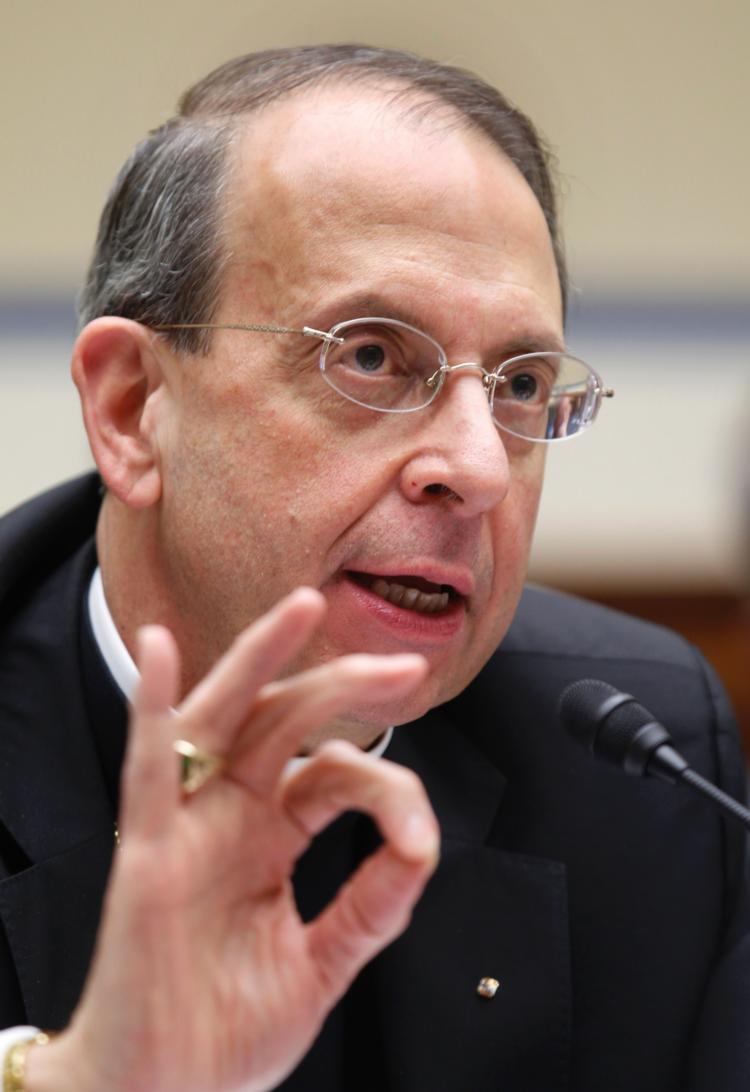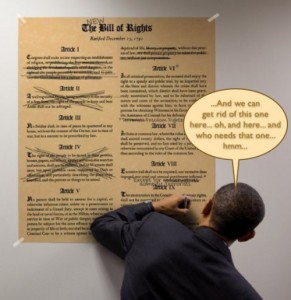Maybe we should write to them too. In the letter below, Archbishop Lori, whom I’ve compared with Detective Columbo in the past, advocates something I’ve heard in the gospels before. Something about being as wise as serpents, and as innocent as doves.
Take a look.
Most Reverend William E. Lori
Archbishop of Baltimore
Chairman
February 15, 2013Dear Representative:
The 112th Congress’s inability to enact appropriations bills for Fiscal Year 2013 left many tasks unfinished. One of the most vitally important of these tasks is to restore a tradition on rights of conscience in health care that has long enjoyed bipartisan consensus, but is now under greatly increased pressure. I urge Congress to address this problem when it considers proposals for continued funding of the federal government in the weeks to come.
In December the House draft of the Labor/HHS appropriations bill included two important provisions supported by the U.S. Conference of Catholic Bishops. One provision (Sec. 537) would extend the longstanding federal policy on conscience to the new coverage mandates for private health plans created by the Affordable Care Act, so Americans are not forced to violate their fundamental moral and religious convictions in order to offer, sponsor and purchase health coverage. The other (Sec. 538) clarifies current nondiscrimination laws to improve protection of individuals and institutions that decline involvement in abortion, allowing the victims of discrimination to vindicate their rights in court.
Section 538 places the Hyde/Weldon amendment, approved every year since 2004 as part of the Labor/HHS appropriations bill, on a firmer legal basis by merging it with an older law against forced involvement in abortion training, the Coats-Snowe amendment of 1996. The Obama administration has said it supports both these laws (76 Fed. Register 9973, 9974 [Feb. 23, 2011]), and President Obama has signed Hyde/Weldon into law several times since 2008. We assume no one in Congress opposes the idea that people whose civil rights have been violated have a right to go to court. So this provision should be accepted without serious controversy.
Section 537 on mandated coverage also has solid precedents in recent federal law, even as applied to contraception. In fact Congress’s mandate for contraceptive coverage in federal employees’ health benefits, enacted in 1999, exempted any insurer with a religious objection. This also allowed employees the freedom to choose a plan consistent with their religious beliefs. Health plans would be excluded from the program if they discriminated against any health professional who “refuses to prescribe or otherwise provide for contraceptives because such activities would be contrary to the individual’s religious beliefs or moral convictions.” In 2000, President Clinton signed into law an appropriations provision instructing the District of Columbia to exempt those with moral or religious objections if it wished to approve a contraceptive mandate for its citizens. Both of these provisions have been renewed by Congress every year since they were first enacted. Senator Moynihan’s bipartisan health care reform bill of 1994, as well, included an opt-out from coverage of “abortion or other services” for those with a moral or religious objection. Reaching farther back, to Congress’s first major law on conscience rights in health care, the Church amendment of 1973 was designed to shield both individual and institutional health care providers from forced involvement in abortion or sterilization, and was amended the following year to protect conscientious objection to other health services generally.
It can hardly be said that all these Presidents and Congresses, of both parties, had been waging awar on women. I have seen no evidence that such laws, showing respect for Americans’ conscientious beliefs, have done any harm to women or to their advancement in society. What seems to be at issue instead is a new, more grudging attitude in recent years toward citizens whose faith or moral principles are not in accord with the views of the current governing power. And while the mandate for coverage of abortion-causing drugs, contraceptives and sterilization is hailed by some as a victory for women’s freedom, it permits no free choice by a female employee to decline such coverage for herself or her minor children, even if it violates her moral and religious convictions.
It is most discouraging that this coercive element remains unchanged in the new notice of proposed rulemaking the Obama administration issued this month in response to widespread criticism of its original mandate. Cardinal Timothy Dolan, President of the United States Conference of Catholic Bishops, has pointed out how the new proposal falls short of meeting the hopes and expectations of many concerned about religious freedom – and he has said the Nation’s bishops remain committed to “engaging with the Administration, and all branches and levels of government,” to address this issue (http://www.usccb.org/news/2013/13-037.cfm). While the new proposal is unclear or incomplete on some points, three things seem clear:
First, the Administration’s new definition of an exempt “religious employer” is briefer than its original four-part definition, but the Administration itself says it does not “expand the universe” of those who are exempt. It maintains the same unacceptable division between places of worship, and religious organizations that focus on putting faith into action by serving the needy.
Second, if a religious organization is not exempt, its insurance company or third-party administrator will impose the full mandate “automatically” on the organization’s employees and their female children, using the personal information that the employer had entrusted to them solely to provide a plan consistent with the organization’s faith. This part of the mandate, if adopted as a final rule, is expected to take effect by August 1 of this year.
Third, all other believers with an objection – individuals and families, nonprofit or for-profit organizations that are not explicitly religious, insurers, third-party administrators – will have the mandate imposed on them without any recourse, as has already begun to occur since August of last year. Their only relief at this point is from federal courts, many of which are granting preliminary injunctions against the mandate on religious freedom grounds.
In short, I fear that the federal government’s respect for believers and people of conscience no longer measures up to the treatment Americans have a right to expect from their elected representatives. The new approach even threatens to undermine access to quality health care, by telling providers as well as those who offer or purchase insurance that they need to drop their participation in the health care system if they want to preserve their religious and moral integrity. A restoration of full respect for one of our Nation’s founding values is urgently needed. I urge you in the strongest terms possible to incorporate the provisions described above in the upcoming legislative proposals to fund the federal government.
Sincerely,
Most Reverend William E. Lori
Archbishop of Baltimore
Chairman, Ad Hoc Committee for Religious Liberty
United States Conference of Catholic Bishops
Opting out of the mandate sounds familiar, and healthy to me. Conscientious objection is, after all, the American way. It’s right up there with truth, justice, baseball, apple pie, and Chevrolet.
I’m not sure how comfortable I am putting a price tag on my freedoms by using the rights I thought were guaranteed to me by the U.S. Constitution, as bargaining chips in the Congressional budget making process though. Seems weird to me, though not much seems normal behind the Beltway these days.
For some analysis of this approach, check out the thoughts of the Patheos Catholic portals’ resident, practicing, politician: Rebecca Hamilton.
UPDATE:
Archbishop Lori’s Prayer for the Church in Times of Transition.













